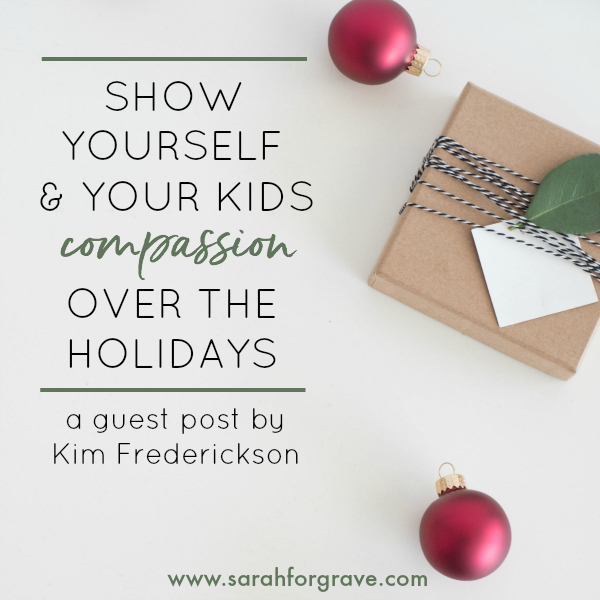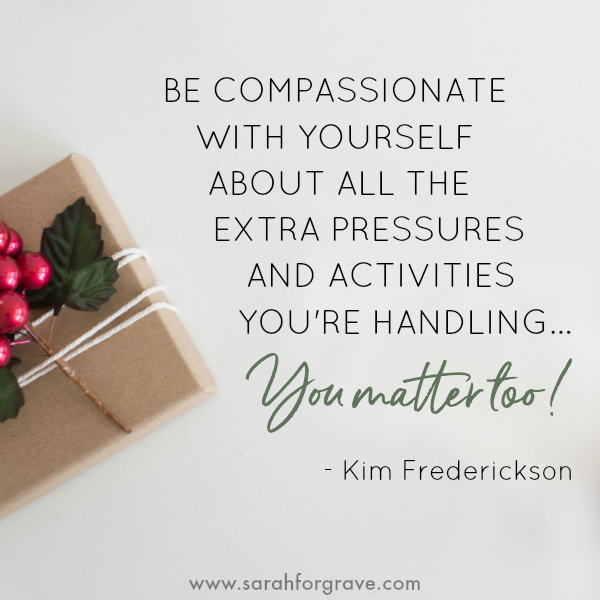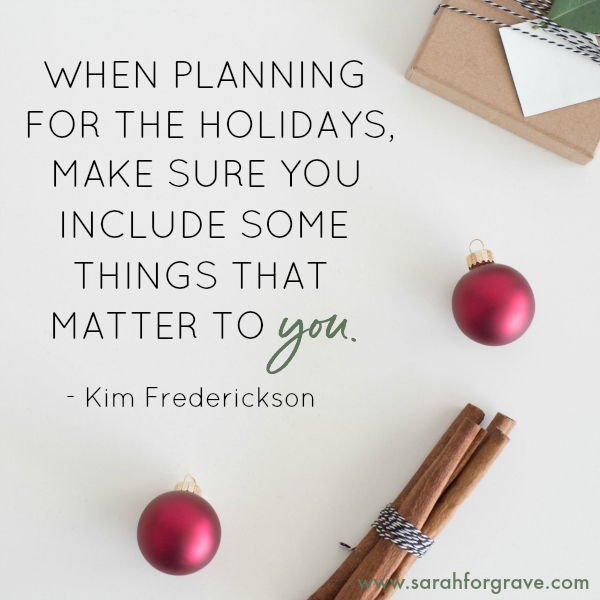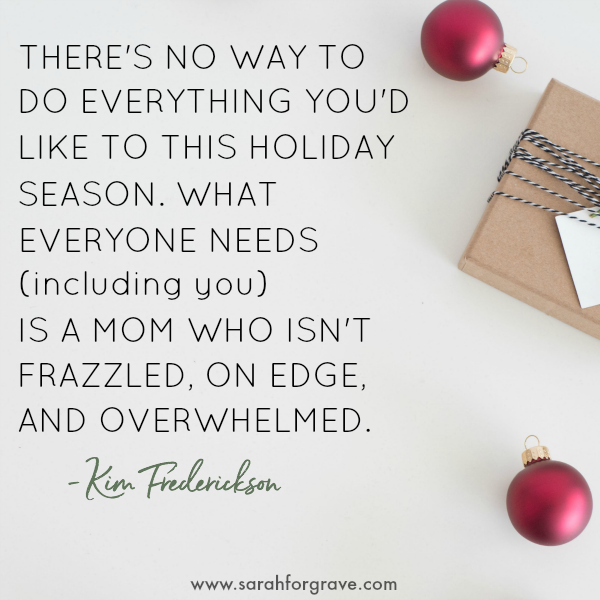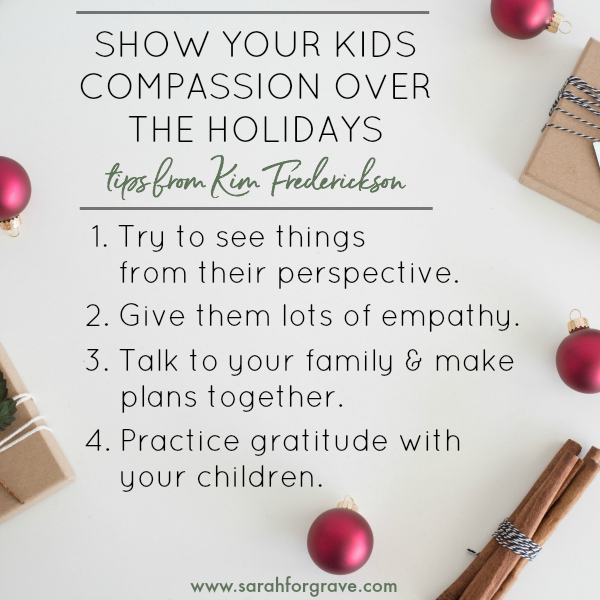I’m SO thrilled to welcome my friend, Kim Frederickson, here today. Kim is an author and licensed marriage and family therapist. She’s also a woman with an incredible journey.
Because of terminal health issues, she wrote a parenting book to give to her adult children, but eventually decided to publish it for others to read. And boy, am I glad she did! I’ve read much of the book and have already found so much wisdom and practical help in my own parenting journey.
I asked Kim if she’d write a post on how to navigate the holidays with our kids. If you’re like me, it’s an incredibly stressful time, and showing compassion to myself and my children feels next to impossible.
Let me tell you right now to fasten your seatbelt, because Kim has written a power-packed article with a wealth of wisdom. Enjoy!
Thanksgiving is just around the corner, and if you’re like me, you’re already exhausted. This year, I encourage you to treat yourself with care and compassion, and extend that to your children too.
Our hopes for the holidays can be a mixed blessing. They help us plan what’s important to us, but can also set up unrealistic expectations that both drive us and discourage us when they don’t happen.
It’s normal to have a mixture of feelings as the holidays approach. On the one hand, it’s a time to be thankful to God for all He’s done for us, as well as enjoy beautiful decorations, fun with our kids, special moments with family and friends, and good food.
On the other hand, it’s normal to feel stressed and have painful feelings pop up too. Amidst the joy, there can be stress from preparations and activities, extra financial pressure, and negotiating visits to relatives. You may also experience grief, as you remember the loss of a loved one through death, separation, or divorce.
TREAT YOURSELF WITH COMPASSION.
It’s important to be compassionate with yourself about all the extra pressures and activities you’re handling. You are more than the mom who makes everything happen. You matter too!
Talk to yourself kindly.
It really helps to talk to yourself as a compassionate friend.
It’s normal for me to feel nervous and stressed as the holidays approach. While there is so much I look forward to, there is also a lot of extra work for me to do to make it all happen. I also have some mixed feelings because of some difficult holidays in the past. I think I’ll be a good friend to myself by not trying to do everything, and not get down on myself when things don’t pan out as planned.
Take care of yourself.
It is helpful to have a plan to take care of yourself as you head into the holidays. Try getting enough sleep (even if you have a lot to do), eat as healthy as you can, take time to move your body (a daily walk), and remove things from your plate that can wait until January or February. Please be kind and compassionate with yourself during the holidays.
What’s important?
Think about what is really important as you approach Thanksgiving, Christmas, and New Year’s. Make sure there are things on your list that are important to you, rather than only focusing on creating good experiences for your family.
Here’s what I ask myself to help me figure out what’s really important to me. Imagine it’s January 5th and you look back on your holidays and say, “Wow, I’m pretty happy with how things went. I’m so glad that this, this, and this happened. I’m really glad I didn’t try to make this and this happen.”
Following are some questions to consider. Choose well…
- What type of gatherings do you want to have with family, friends, and co-workers?
- What type of alone time or rest would you like for yourself? How can you make this happen?
- Are there any events you want to be a part of?
- What type of spiritual moments, traditions, or special foods do you want to make happen?
- How would you like to thank and honor God as you move into the holidays and the New Year?
- Would you like to give and serve others during the holidays?
- Do you want to cook over the holidays or order out? How busy do you want to be with all this?
- How can you minimize your workload this season?
- What type of decorating (inside/out) are meaningful to you?
- What expectations or activities can you drop?
- Who could you ask help from or collaborate with? This could include hiring help, trading child care so you can cook, shop, and wrap presents, etc.
- What is the most important thing you can do for yourself as you head into the holidays?
Share your needs too.
Part of being compassionate with yourself includes not falling into the trap of expecting others to know what you want, without sharing your wishes. This results in becoming resentful when your needs aren’t included. When planning for the holidays, make sure you also include some things that matter to you, that don’t depend on the actions of someone else.
Include God.
Don’t forget to include and honor God as you go through this season. Think of ways that are meaningful to you to honor Him and include Him throughout the season.
Practice gratitude.
Focus on all you are thankful for. It’s easy to focus on what’s not happening or what went wrong. Look around you and make a list, starting today, of all you are grateful for. If you look, there’s a ton!
Honor those not able to be with you.
If you are missing someone special during the holidays, make sure and do things that keep them with you in some way. Some ideas might be to keep a picture of them nearby, allow yourself to feel sad as well as happy as you remember them, or do activities that they loved to do during the holidays.
Do things as simply as possible.
There’s no way for you to do everything you’d like to this holiday season. Drop things not absolutely necessary, look for ways to take shortcuts rather than do everything yourself. What everyone needs (including you) is a mom who isn’t frazzled, on edge, and overwhelmed. This is more important than getting everything done.
THE HOLIDAYS ARE STRESSFUL FOR KIDS TOO.
Our kids get so excited about holiday traditions, games, food, and TOYS! They get worn out and overwhelmed by activities, expectations, sugar, and visiting relatives. Everywhere they go they are reminded about the holidays, and can get caught up with what they want for gifts. All of this stress can cause lots of meltdowns.
Keep this in mind as you plan activities for your children. They are even less able to adapt to changing circumstances and extra stress than we are.
Try to see things from their perspective.
Remind yourself how hard it is to be a little one with a changing schedule who isn’t getting enough sleep, doesn’t get all s/he is hoping for, and has a stressed-out mom.
Give them lots of empathy.
Empathize with how hard things are from their perspective. Your kind words will help them calm down, feel understood, and teach them to be kind to themselves too. Empathetic statements like these will really help:
- “It’s so hard to have to travel to visit our family. You’d rather just be at home, even though you love seeing grandma and grandpa.”
- “I know you are so tired because we stayed up late to go to your sister’s play. I’m tired too.”
- “I know you really wanted that special toy, and it’s so hard to know you didn’t get it.”
Talk to your family and make plans together.
This is a great way to talk as a family and let everyone have input, and also set realistic expectations. Here’s an example:
I want to talk with you about Thanksgiving. There are so many fun things to look forward to, but it can also be stressful because there is so much more to do. What are you looking forward to? Is there anything about this holiday you don’t like? I wish we could do all those things, but we won’t be able to. What is one thing you really hope will happen?
Mommy will need some extra help, so I’ll be asking you to help me with different things. It will help me not be tired and crabby, and we’ll have more time to play and have fun together.
Practice gratitude with your children.
Take time each day to share what you are all grateful for. This will make a huge difference in everyone’s outlook, and will help your kids develop a wonderful life-giving habit for a lifetime.
I hope these ideas help you be compassionate with yourself and your children this holiday season. Being a friend to yourself will help so much, and be a wonderful example to your kids, too!
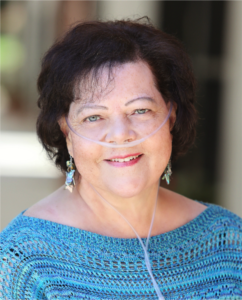 Kim Fredrickson is a licensed marriage and family therapist of thirty years. She loves to teach others about the power of self-compassion from a faith perspective. She is the author of Give Yourself a Break: Turning Your Inner Critic into a Compassionate Friend and Give Your Kids a Break: Parenting with Compassion for You and Your Children. She recently retired from her counseling practice when diagnosed with pulmonary fibrosis, a terminal lung disease that developed as a rare complication from the chemotherapy and radiation she received for breast cancer.
Kim Fredrickson is a licensed marriage and family therapist of thirty years. She loves to teach others about the power of self-compassion from a faith perspective. She is the author of Give Yourself a Break: Turning Your Inner Critic into a Compassionate Friend and Give Your Kids a Break: Parenting with Compassion for You and Your Children. She recently retired from her counseling practice when diagnosed with pulmonary fibrosis, a terminal lung disease that developed as a rare complication from the chemotherapy and radiation she received for breast cancer.
After being diagnosed with a terminal illness, she decided to write this book as a way to have a positive influence in the lives of her adult children and their future grandchildren. Kim wanted to help them with the challenges of parenting, when the time came. She knew she wouldn’t be around to hold her grandbabies and help her children raise them in person. Originally it was only going to be for them. As Kim wrote, she thought others might benefit as well, so decided to self-publish it.
Kim has been married to her husband, Dave, for thirty-nine years and they have two grown children. Learn more and read her blog at www.kimfredrickson.com. She also writes a weekly patient column for Pulmonary Fibrosis News, Just Breathe…Compassionate Help for the PF Journey. Thousands of patients and their loved ones read her column all over the world.
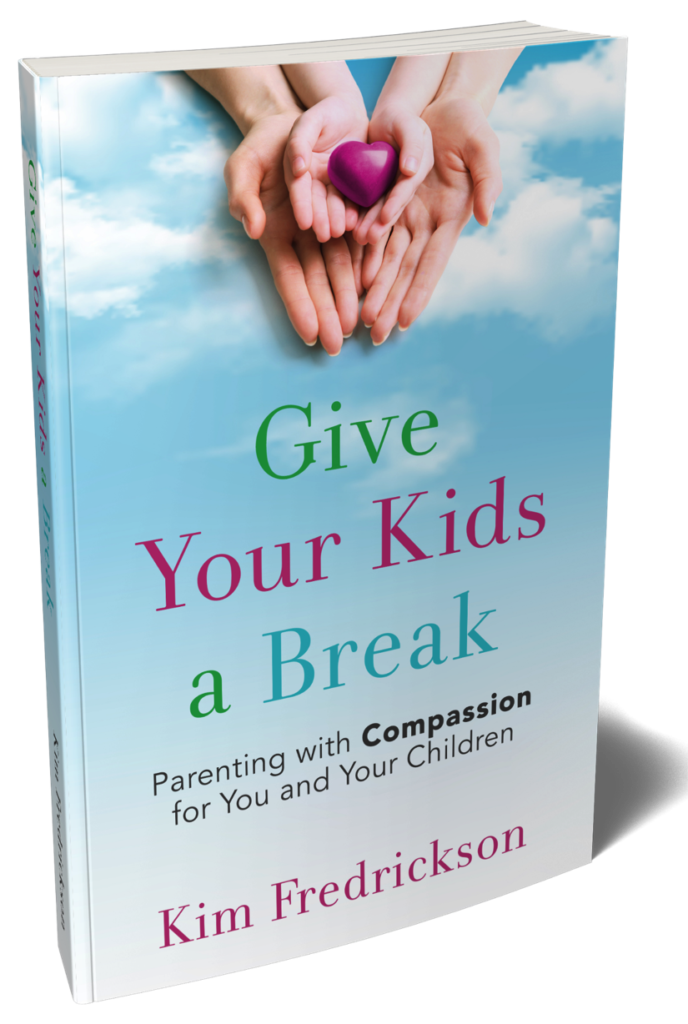 Give Your Kids a Break: Parenting with Compassion for You and Your Children helps parents treat themselves with kindness as they struggle with the demands of parenting. It helps them teach their children how to be compassionate with themselves as they learn new things, obey boundaries, learn to be responsible, and manage their emotions, money, and chores.
Give Your Kids a Break: Parenting with Compassion for You and Your Children helps parents treat themselves with kindness as they struggle with the demands of parenting. It helps them teach their children how to be compassionate with themselves as they learn new things, obey boundaries, learn to be responsible, and manage their emotions, money, and chores.
When parents practice self-compassion, they have more love and understanding to give their kids and don’t waste energy beating themselves up. When kids practice self-compassion, they become more resilient, feel better about themselves, and have a greater ability to handle life’s problems.
*blog title photos and quote photos by Jana at Twigy Posts
